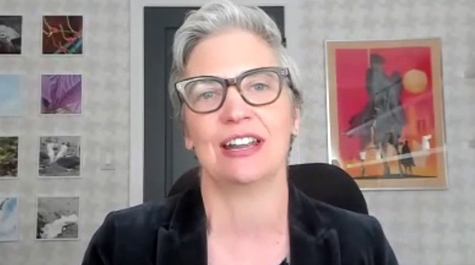Joanna Schwartz Delivers William & Mary Law School’s Annual George Wythe Lecture
Professor Joanna Schwartz presented William & Mary Law School’s annual George Wythe Lecture on Monday, March 7.
Schwartz is Professor of Law at UCLA School of Law, where she teaches Civil Procedure and a variety of courses on police accountability and public-interest lawyering. Her Wythe Lecture was titled “Civil Rights Without Representation.”
Introducing her to the William & Mary community via Zoom, Dean Benjamin Spencer praised Schwartz as “one of the country's leading experts on police misconduct litigation, authoring groundbreaking articles on the realities of who pays when the police are found liable.”
In her Wythe Lecture, Schwartz addressed the problem of access to counsel for civil-rights plaintiffs, such as those injured by illegal police conduct. As is true in civil litigation generally, the majority of plaintiffs asserting violations of their civil rights do not have attorneys to represent them. This is so despite the fact that Congress, in an effort to promote access to justice, has enacted a statute that permits victorious civil-rights plaintiffs to recover reasonable attorneys’ fees.
Schwartz explained that various hurdles and limitations nonetheless prevent attorneys from taking on these cases except for those with the most grievous injuries and clearest path to victory. Her conclusions were supported by extensive research into case files and court dockets.
Schwartz proposed several ways of increasing access to counsel. These potential reforms include changing how fees are calculated, establishing new law clinics, and more extensive use of court-appointed counsel.
Schwartz also explained that reforms to some of the legal doctrines that make it hard for plaintiffs to win—such as the “qualified immunity” that often shields official misconduct—could help as well.
Schwartz’s lecture will be published in the William & Mary Law Review.
Schwartz received UCLA's Distinguished Teaching Award in 2015, and served as Vice Dean for Faculty Development from 2017-2019. She is co-author, with Stephen Yeazell, of a leading casebook, Civil Procedure (10th Edition), and her recent scholarship includes articles empirically examining the justifications for qualified immunity doctrine; the financial impact of settlements and judgments on federal, state, and local law enforcement officers and agency budgets; and regional variation in civil rights protections across the country.
Schwartz is a graduate of Brown University and Yale Law School. After law school, she clerked for Judge Denise Cote of the Southern District of New York and Judge Harry Pregerson of the U.S. Court of Appeals for the Ninth Circuit. She was then associated with Emery Celli Brinckerhoff & Abady LLP, in New York City, where she specialized in police misconduct, prisoners' rights, and First Amendment litigation.
The George Wythe Lecture Series began at the Law School in 1976. Wythe (1726-1806) was a distinguished lawyer, statesman, and judge, and mentor to Thomas Jefferson. In 1779, at Jefferson’s urging, he was appointed as William & Mary’s—and the nation’s—first professor of law.
About William & Mary Law School
Thomas Jefferson founded William & Mary Law School in 1779 to train leaders for the new nation. Now in its third century, America's first law school continues its historic mission of educating citizen lawyers who are prepared both to lead and to serve.



